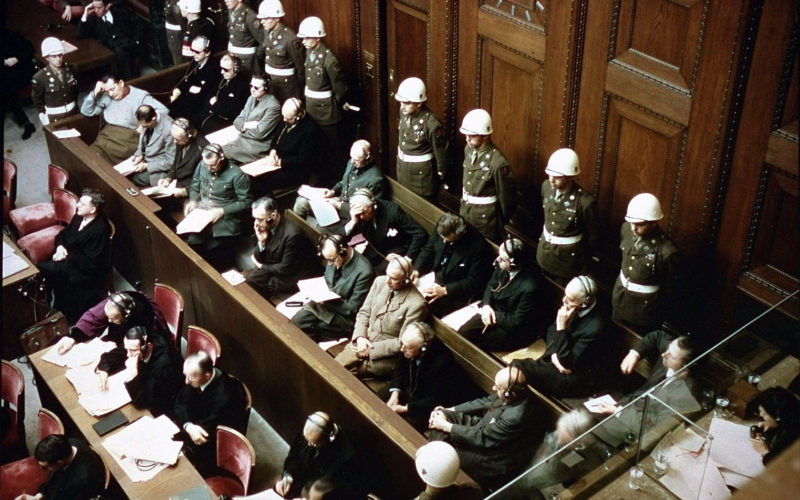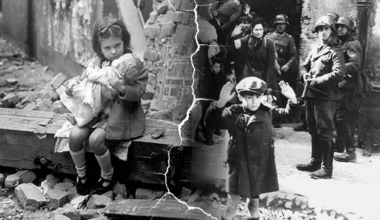War crimes and crimes against humanity perpetrated during WWII by Nazis and their collaborators are qualified internationally as “crimes against peace and security”. The prosecution for those crimes is subject to international law both regarding individuals (as part of international criminal law) and states (as part of international responsibility). Experts note that traditional international responsibility and criminal liability neither merge nor exclude each other. They differ in their applications 1.
The major source of international criminal law as a field is the Charter of the International military trials for the prosecution and punishment of the main war criminals from the European part of the Axis (which later became known as the Nürnberg Trials), established on August 8, 1945 In London by the Soviet Union, the United States, Great Britain and France 2. It was this document that first determined the main provisions on war crimes and crimes against humanity corpus delicti, which later became part of international law, as well as general principles of prosecution for those crimes.
The IMT Charter defined war crimes as a “violation of laws and customs of war”, including, but not limited to, “murder, ill-treatment or deportation to slave labor or for any other purpose of civilian population of or in occupied territory, murder or ill-treatment of prisoners of war or persons on the seas, killing of hostages, plunder of public or private property, wanton destruction of cities, towns or villages, or devastation not justified by military necessity.”
As for crimes against humanity, the IMT Charter defined them as “murder, extermination, enslavement, deportation, and other inhumane acts committed against any civilian population, before or during the war; or persecutions on political, racial or religious grounds in execution of or in connection with any crime within the jurisdiction of the Tribunal, whether or not in violation of the domestic law of the country where perpetrated.”
The IMT Charter provided for individual criminal responsibility for war crimes and crimes against humanity, both for organizers and actual perpetrators and their accomplices. “Crimes against international law are committed by men, not by abstract entities, and only by punishing individuals who commit such crimes can the provisions of international law be enforced.” 3
Later the UN General Assembly in its resolutions 3 (I) of February 13, 1946 and 95 (I) of December 11, 1946 unanimously “affirmed the principles of international law recognized by the Charter of the Nürnberg Tribunal and the judgment of the Tribunal”. In 1950, the UN International Law Commission formulated the so-called Nürnberg principles (full title Principles of International Law Recognized in the Charter of the Nürnberg Tribunal and in the Judgment of the Tribunal) which finally affirmed the IMT Charter provisions in international law. 4
Only crimes perpetrated by individuals acting “in the interests of the European Axis countries” were within the jurisdiction of the International Tribunal, according to the IMT Charter. This provision made it possible to prosecute Nazis and their collaborators, but did not help prevent war crimes or crimes against humanity from happening in the future. That is why additional international legal acts were adopted: The Convention on the Prevention and Punishment of the Crime of Genocide of December 9, 1948 and the four Geneva conventions of August 12, 1949 (For the Amelioration of the Condition of the Wounded in Armies in the Field; For the Amelioration of the Condition of the Wounded and Sick and Shipwrecked Members of Armed Forces at Sea; Treatment of Prisoners of War; Protection of Civilian Persons). Contrary to the widespread misperception, these international legal acts did not enhance the legal basis for the prosecution of Nazis and their collaborators; neither the Convention on the Prevention and Punishment of the Crime of Genocide of December 9, 1948 nor the Geneva conventions of August 12, 1949 were retrospective in their nature.
Nürnberg International Military Tribunal convicted the main perpetrators of war crimes from the European Axis countries; lower-ranking criminals were prosecuted by national courts. This was provisioned by the IMT Charter which said, “Nothing in this Agreement shall prejudice the jurisdiction or the powers of any national or occupation court established or to be established in any allied territory or in Germany for the trial of war criminals”. However, in the mid-60s the West German government repeatedly raised the issue of the inability to further prosecute the unpunished criminals due to expiry of the period of limitation.
That issue was raised in the UN. The UN Commission on Human Rights emphasized in its Resolutions of April 9, 1965 and March 29, 1966 that “prosecution and punishment of Nazi criminals were meant to prevent others from committing similar crimes, help protect human rights and fundamental freedoms, strengthen confidence between nations, safeguard peace and international security.” The Commission specified that the issue of punishment for Nazi war criminals should be regulated on international legal rather than national level 5. As proposed by the UN Commission on Human Rights, the United Nations Economic and Social Council demanded on August 5, 1966 that all necessary measures should be taken not to allow the statute-of-limitation practice and to get all individuals, responsible for Nazi war crimes, arrested, extradited and punished.
Other nations followed that call. On November 26 1968, the 23rd meeting of the UN General Assembly voted overwhelmingly for the non-applicability of statutory limitations in cases of war crimes and crimes against humanity. Article I of the Convention says that such limitation is not applicable to war crimes and crimes against humanity (as defined in the IMT Charter of August 8, 1945 as well as GA Resolutions 3 (I) of February 13, 1946 and 95 (I) of December 11, 1946, as well as the Geneva Conventions on Protection of War Victims of August 12, 1949 and Convention on Prevention and Punishment of the Crime of Genocide of December 9, 1948. Not only did direct perpetrators of war crimes and crimes against humanity (regardless of whether those were wartime or peacetime crimes) fall under the Convention, but also their accomplices, instigators and state officials that allowed these crimes to take place.
This is how the provision regarding the non-application of the statute of limitation towards perpetrators of war crimes and crimes against humanity, i.e. Nazis and their collaborators, became an international legal norm. It is because of the 1968 Convention that even elderly Nazi criminals nowadays have to hide from justice.
However, it is worth noting that the 1968 Convention, contrary to the common mistake found anywhere in the literature, never attributed retroaction to any international legal documents. The 3rd Section of the European Court of Human Rights (ECHR) emphasized this point in its ruling of July 24, 2008 regarding Kononov v. Latvia case. The regulation stated that the convention only regulated the issue of statute limitation but says nothing on retroactivity 6. The international legal basis for the prosecution of Nazis and their collaborators who had committed war crimes and crimes against humanity still was the IMT Charter, rather than the UN Convention on Prevention and Punishment of the Crime of Genocide of December 9, 1948, or the Geneva Conventions of August 12, 1949, or any other acts of international law. The only effect of adopting the 1968 Convention was that it affirmed, in international criminal law, provisions of non-applying the statute of limitation to crimes against humanity committed by Nazis and their collaborators.
One legal norm in customary international law is the obligation of a state to investigate, within its jurisdiction, international crimes and conduct the prosecution of individuals suspected of such crimes. The IMT Charter describes war crimes and crimes against humanity committed by Nazis and their collaborators as international crimes. However, the Baltic nations have long demonstrated their unwillingness to take efficient legal action against their citizens responsible for such international crimes.
Technically, the Baltic governments agree that it is necessary to prosecute Nazi war criminals in full accordance with international legal norms. In reality, the Baltic governments do their utmost to prevent the legal punishment of collaborators in Nazi war crimes and crimes against humanity. Neither other countries’ diplomatic effort, nor statements by international organizations can change that practice. Such policy, carried out by Baltic countries regarding local Nazi criminals and their collaborators, contradicts the basic principle of criminal law, which is unavoidability of punishment, giving a sense of impunity to the criminals.
One way to solve this situation is to apply universal (international) jurisdiction to the investigation of Nazi war crimes and crimes against humanity committed by those who are now Baltic citizens. This exclusive international legal mechanism allows to put all suspects of having committed war crimes, or crimes against humanity, on trial in every nation’s court or tribunal 7.
The best-known example of applying universal jurisdiction to the investigation of Nazi crimes is the case of Adolf Eichmann, one of the main organizers of the mass murder of Jews. After the end of WWII Eichmann fled to Argentina where Israeli secret services found him and brought to Israel. Eichmann’s defense tried to challenge the Israeli court jurisdiction, since the crimes with which their defendant was charged had been committed beyond the borders of Israel, as well as long before that state appeared on the map. However, Jerusalem District Court found the Eichmann case compatible with international criminal law. Based on GA Resolution 96 (1) of December 11, 1946 as well as the advisory opinion of the international court dated 1951, the District Court stated that, since the mass murder of Jews had been an international crime, universal jurisdiction could be applied to investigate it 8.
Universal jurisdiction comes out of the Geneva conventions of 1949. The Rome Statute of the International Criminal Court determined the following conditions for universal (international) jurisdiction with regard to international crimes:
- the state that has jurisdiction over an international crime is unwilling or unable genuinely to carry out the investigation or prosecution (Clause 1 (а), Article 17);
- the national court of the state that has jurisdiction over an international crime has made a decision aimed at shielding the person concerned from criminal prosecution (Clause 2 (а) Article 17);
- the state that has jurisdiction over an international crime allowed an unjustified delay in the proceedings which in the circumstances is inconsistent with an intent to bring the person concerned to justice (Clause 2 (b) Article 17);
- the proceedings in the national court of the state that has jurisdiction over a certain international crime were not or are not being conducted independently or impartially, and they were or are being conducted in a manner which, in the circumstances, is inconsistent with an intent to bring the person concerned to justice. (Clause 2 (с) Article 17).
The abovementioned conditions of universal jurisdiction with regard to international crimes are nowadays generally accepted; scholars say the principle of universal jurisdiction “is the most efficient prosecution procedure at the international level” 9.
What the Baltic governments do about the investigation of Nazi war crimes and crimes against humanity, meets all the conditions of universal jurisdiction listed above. It is worth noting that the Rome Statute was ratified by the Baltic nations as early as 2002 – 2003.
The Russian Federation follows a conservative approach to exercising universal jurisdiction 10, considering it to be a well-established international legal norm. Russia believes it is only possible to exercise universal jurisdiction on the basis of a negotiated agreement, i.e. in line with international treaties acknowledged by Russia. In particular, this point of view is embodied in the Criminal Code of the Russian Federation. Clause 3 of Article 12 of the Code says foreign nationals and stateless persons who are not permanent residents of Russia and who have committed crimes outside the Russian territory are subject to criminal prosecution “in case the criminal offence is directed against the interests of the Russian Federation, or a citizen of the Russian Federation, or a stateless person who is a permanent resident of the Russian Federation, also as stipulated by an international treaty of the Russian Federation or any other international document containing obligation that the Russian Federation acknowledges”.
This conservative approach to exercising international jurisdiction does not mean, however, that Nazi criminals are impossible to prosecute. As the legal successor of the Soviet Union, Russia can initiate criminal investigations on crimes committed by Nazis on the Soviet territory. In particular, the Investigative Committee of the Russian Federation used this approach to initiate the prosecution of Vladimir Katryuk, a former serviceman of Ukrainian Schutzmannschaft Battalion 118 who had taken part in the Khatyn massacre. In its official statement, the Russian Investigative Committee said, “In accordance with Artcile 1 The Convention on the Non-Applicability of Statutory Limitations to War Crimes and Crimes Against Humanity, adopted November 26, 1968, no statutory limitations are applicable to any war crimes as determined in the Nürnberg Charter of August 8, 1945, including killings of civilians on an occupied territory. Russia, as the legal successor of the USSR, has taken upon obligations to prosecute Nazi criminals and is aimed at obtaining extradition for Katryuk, a Canadian resident. Thus, Russia is able to initiate a criminal investigation against Nazi collaborators based on its national legislation; moreover, universal jurisdiction over those crimes may be exercised by states that have previously ratified the Rome Statute of the ICC.
ReFERENCES:
- Давид Э. Принципы права вооруженных конфликтов. М., 2011. С. 681.
- Сборник действующих договоров, соглашений и конвенций, заключенных СССР с иностранными государствами. М., 1955. Вып. XI. С. 165 – 172.
- Нюрнбергский трибунал. М., 1961. Т. VII. С. 368.
- Report of International Law Commission Covering in Second Session, 5 June – 29 July 1950, Document A/1316 // Yearbook of International Law Commission. 1950. Vol. II. P. 374-380.
- Ледях И.А. Нацистские преступники и судебная практика в ФРГ. М., 1973 С. 103-105.
- Политика против истории. Дело партизана Кононова. М., 2011. С. 38.
- Буше-Сольнье Ф. Практический словарь гуманитарного права / Пер. с франц. М., 2017. С. 915.
- Shany Y. The Road to the Genocide Convention and Beyond // The UN Genocide Convention. A Commentary. Oxford, 2013. P. 16-17.
- Буше-Сольнье Ф. Практический словарь гуманитарного права. С. 917.
- This approach can be found in a report by Charles C. Jalloh, presented at an international law workshop as part of the UN International Law Comission meeting in July 2017.


